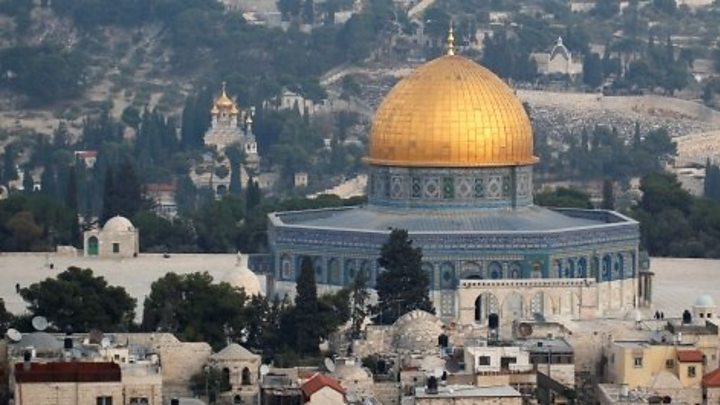EU’s Federica Mogherini rebuffs Netanyahu on Jerusalem

Media playback is unsupported on your device
The EU's foreign policy chief says there is "full EU unity" in support of Jerusalem becoming the capital of both Israel and a future Palestinian state.
Federica Mogherini said the bloc's member states would not recognise Jerusalem as Israel's capital before a final status peace agreement.
She spoke after meeting Israeli Prime Minister Benjamin Netanyahu, who wants the EU to follow the US in doing so.
President Donald Trump's move prompted widespread international criticism.
Ms Mogherini, who was speaking at a news conference in Brussels alongside Mr Netanyahu, said the EU would continue to recognise the "international consensus" on Jerusalem.
"I have to say that PM Netanyahu realised, I think, from the ministers themselves that there is full EU unity on this, that the only realistic solution to the conflict between Israel and Palestine is based on two states with Jerusalem as the capital of both the state of Israel and the state of Palestine.
"The EU and member states will continue to respect the international consensus on Jerusalem until the final status of the holy city is resolved, through direct negotiations between the parties."
But Mr Netanyahu said the US decision was a recognition of "reality".
He is in Brussels for talks with EU foreign ministers – the first time an Israeli prime minister has visited the city in more than 20 years.
Protests against the recognition of Jerusalem are continuing in the region, including Dahia, the Hezbollah stronghold in Beirut.
Speaking from an undisclosed location, Hezbollah leader Hassan Nasrallah said: "Trump thought that when he made his announcement… capitals around the world and in Arab countries would rush to support him.
"Now he seems isolated, only supported by Israel. This position is very important and should be built upon."
In the West Bank, dozens of Palestinians threw stones at Israeli soldiers; there have also been calls for demonstrations in Tehran and Beirut.
As well as recognising Jerusalem, President Trump also said he was directing the US state department to begin preparations to move the US embassy from Tel Aviv to Jerusalem.
Why Trump's move was controversial
Israel regards Jerusalem as its "eternal and undivided" capital, while the Palestinians claim East Jerusalem – occupied by Israel in the 1967 Middle East war – as the capital of a future Palestinian state.
Israeli sovereignty over Jerusalem has never been recognised internationally, and all countries maintain their embassies in Tel Aviv.

Media playback is unsupported on your device
According to the 1993 Israel-Palestinian peace accords, the final status of Jerusalem is meant to be discussed in the latter stages of peace talks.
Since 1967, Israel has built a dozen settlements, home to about 200,000 Jews, in East Jerusalem. These are considered illegal under international law, though Israel disputes this.
Jerusalem is also home to key religious sites sacred to Judaism, Islam and Christianity, especially in East Jerusalem.
How the world reacted
Mr Trump's announcement drew worldwide condemnation and sparked protests which continued for a fifth day on Monday.
Aside from the Beirut demonstrations, Palestinians threw stones at Israeli security forces in the West Bank city of Ramallah.
Where countries stand on Jerusalem move
In other developments:
- Germany's Chancellor Angela Merkel said her country opposed all forms of anti-Semitism after an Israeli flag was burned in Berlin by demonstrators on Sunday
- Swedish police have detained three men after a burning object was thrown at a synagogue in the city of Gothenburg late on Saturday
[contf] [contfnew] 
BBC
[contfnewc] [contfnewc]
The post EU's Federica Mogherini rebuffs Netanyahu on Jerusalem appeared first on News Wire Now.



